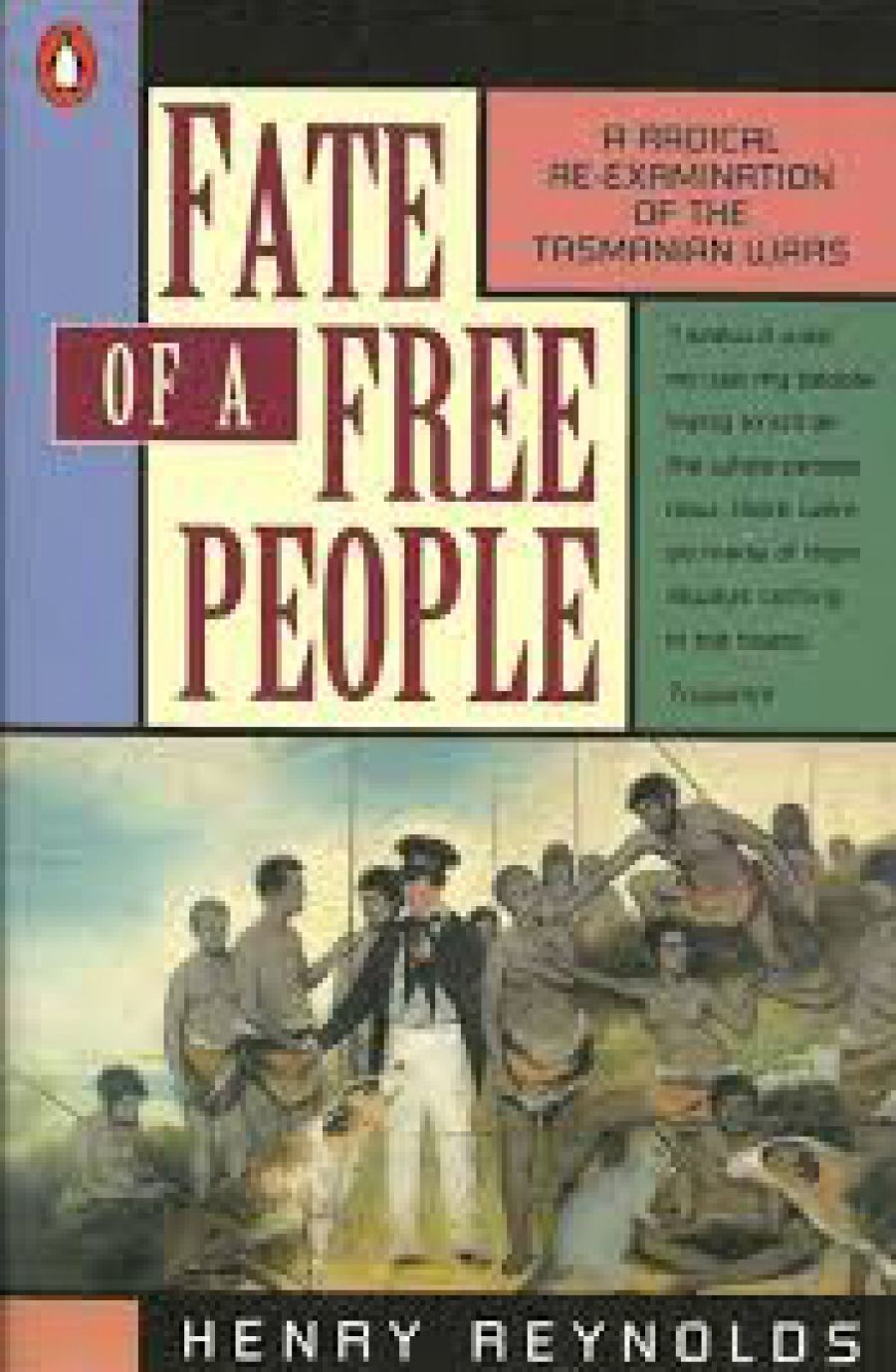
- Free Article: No
- Contents Category: History
- Review Article: Yes
- Custom Highlight Text:
Making the sea passage south to Flinders Island, I began reading this while off-watch, hoping book and destination might augment, but tough weather cancelled free time until after a landfall sleep. I’ve not much enjoyed histories which cast these manuka and granite islands in dismal role, they are shockingly beautiful, but the crowded cemetery wails, the old lath church is empty of joyful song, and the rule of Commandant Jeanneret recalls similar miseries of bonded Malay and Bantamese on Cocos.
- Book 1 Title: Fate of a Free People
- Book 1 Subtitle: A radical re-examination of the Tasmanian wars
- Book 1 Biblio: Penguin, $16.95 pb
White settlers here might now feel more comfortable with their island’s history, but comfort with its future is another matter. With me on this voyage was a local fisherman who saw Reynolds’ book in my kit. His face was apprehensive. Now, racial antipathy in the Furneaux group is not simple anymore. Aboriginal families are well educated, worldly, as commercially adept as anyone. The few recidivist drunks around here are not of their number. Some severe antagonists of the Aboriginal Co-operative have themselves a mingled Islander genetic stream, which is a hard secret to keep in this part of the world. So, enmity focuses on welfare and subsidy.
Land rights claims have so far centred around Settlement Point and the mutton bird rookeries, and I guess the fear of the fisherman sailing with me was of a renewed squall-line from that quarter. But Reynolds takes the claim further: if Aborigines have not inherited Native Rights elsewhere, then Wybalenna and the birding grounds at Babel, Green, and the two Dog Islands are no longer the ambit, they may be entitled to the entirety of Flinders Island.
The necessary legal sequence is Indigenous ownership, invasion, war, negotiated compact, inheritance of rights. Reynolds spends time destroying the usual histories of invasion, which see only a confused and ragtag resistance. Vividly he displays a war. Aboriginal surprise, skirmishes, withdrawal, the beginning of cautious mediation, a possible new manner of living, this progression is followed by shock at the extent of the settlement zone, loss of bushland to axe and torch, protection of pastures by elimination of wallaby and goose, and a heart-wrenching fear at the unending shiploads of settlers treading the wharves.
Here began a war which saw unusual alliances between tribes, modified cultures to allow skilled women to captain in the field, and a recognizable guerrilla regimen. So successful were they that every settler went armed, all in daily fear of attack, and Governor Arthur proclaimed Martial Law, calling for reinforcing regiments from Britain. All not too different, so far, from later New Zealand experience.
The fourth step in Reynolds’ argument, negotiated compact, is not so easy of proof. After the Black Line slaughter George Robinson was commissioned to effect ‘an intercourse with this unfortunate race’, first on Bruny Island, amended to include tribes far beyond the settlement zone, with removal of two hundred to Flinders Island. In Reynolds’ view, which seems irresistible, Robinson’s role was persuasive, therefore a negotiation, agreement evidenced by Aboriginal compliance, and his authority proven by resettlement and journals.
But what were the terms? Here Reynolds reaches for the 1847 petition to Queen Victoria, signed by eight of the ‘free Aborigines’ on Flinders Island and led by Ben Lomond Chief Walter Arthur, claiming a negotiated peace, to which they had kept by giving up their homelands and transferring to the island, not as a gaol but resettlement by pledge.
And in return? The immediate subject of the plea was protection from the threat of the Commandant’s return, but it also recorded claims to the Queen’s protection, free education, free religious guidance, and an entitlement to a free and well provided life on the island without labour.
An argument Reynolds puts here in explanation of the clause ‘we are your free children’ involves a claim to an adoptive kinship with the Queen, which I don’t believe is plausible, or necessary. Certainly in southern Polynesia this is used as a metaphor only, say, in the Latinate sense the Pope has with his flock. More important is the assumption by an Aboriginal ruler that a Queen will keep to her pledge, not only as an imperative in law, but as a fundamental of chiefly personality.
Most whites here and in New Zealand are confused by a Maori who is reluctant to vote for a republic, yet bends to bare the buttocks as the Queen limousines by. Here I believe the Maori and Chief Walter Arthur would share the same view. A pact was made with a Queen; the Queen must act with chiefly honour.
If the petition’s claims are proven, the alternatives are momentous. Should the Crown have broken its pact by repatriating the Aborigines from Flinders Island without returning their homelands, Native Title might operate over parts of Larger Tasmania. If the pact obtains, Aborigines may be entitled to Flinders Island, and perhaps outlying islands as well, maybe except for an acreage once set aside for convict barracks.
Who owns the wharf my vessel rests at? Who the cottage at White Beach, the tavern, the midland soldier-settlement farms, the shops, and on Tin Kettle Isle the house where penguins live beneath? Who can sell or buy, and what bank may fund? And now rises the final step. Whose is an Aboriginal inheritance here? For an Islander this is no easy quest. Sealers and steam-packets brought press-ganged Maori, Samoan, Tongan, Koori. Local memory will have answers, but what might a tribunal find? Hearts will ache all over the island. I can’t help thinking it might have been wise for white folk to have conceded Wybalenna and the bird rookeries but, whatever the turmoil, our nation must heed this exceptional work.


Comments powered by CComment